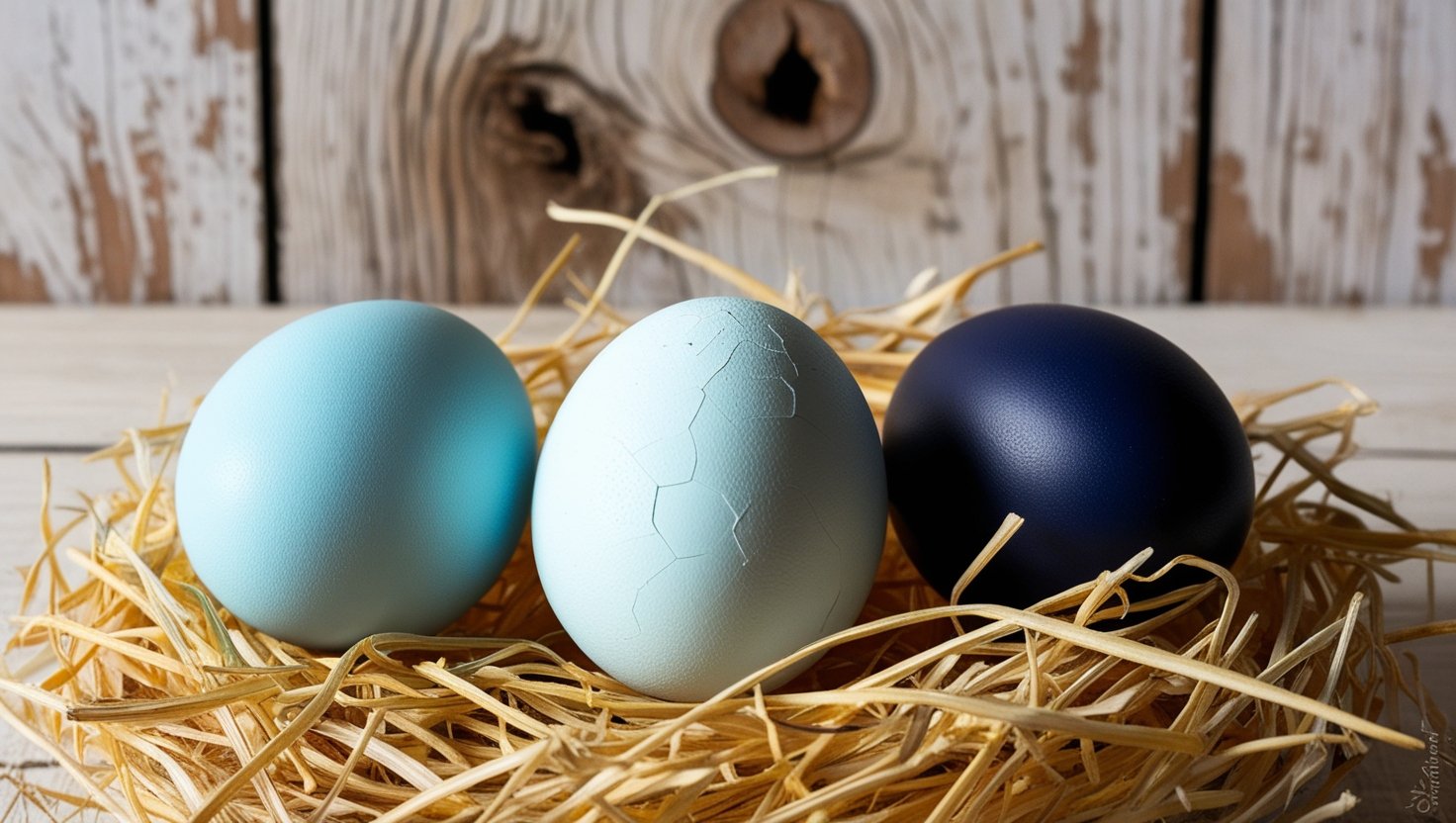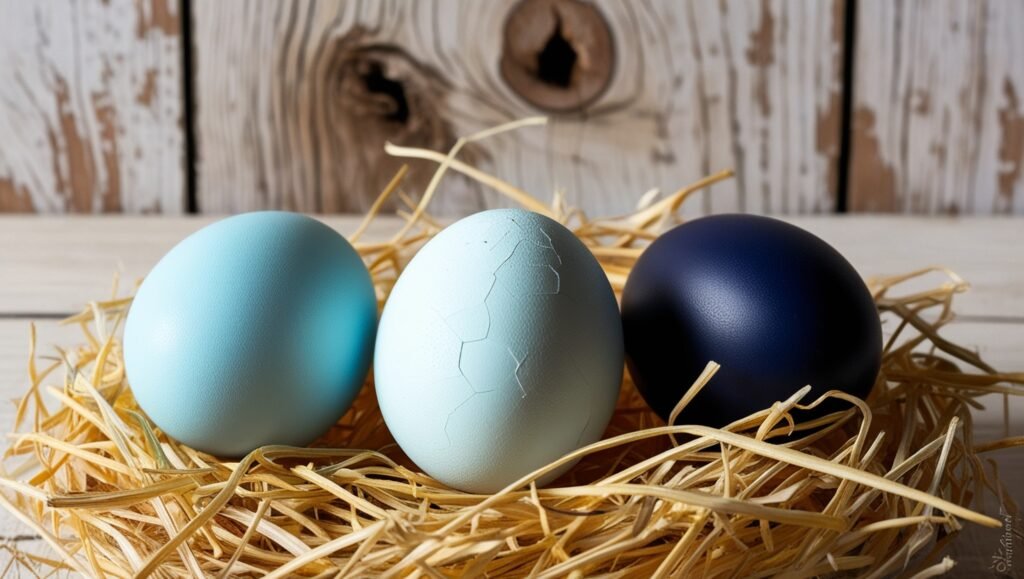What Color Eggs Do Ameraucanas Lay?
A Colorful Surprise in the Nest Box

Emma had just started raising backyard chickens. One morning, while checking the nesting boxes, she saw something unexpected: a beautiful egg the color of a pale robin’s egg. It wasn’t white. It wasn’t brown. It was blue.
She smiled, holding the delicate shell up to the sunlight. That egg had come from her Ameraucana hen, and she had just discovered one of the most unique quirks in the poultry world.
If you’ve been wondering what color eggs Ameraucanas lay—and why they’re so special—you’re in the right place. In this article, we’ll uncover the genetics, history, and beauty behind these birds’ legendary eggs.
The Short Answer: Ameraucanas Lay Blue Eggs
Yes—true Ameraucana chickens lay blue eggs. Not green. Not pink. Not brown. Not white.
Their eggs are known for their clear, sky-blue shell, a feature that makes them one of the most sought-after heritage breeds for hobbyists and small homesteaders alike.
But how did this happen? And why is it such a big deal?
Let’s crack the mystery open.
Understanding Egg Colors in Chickens
To understand why Ameraucanas lay blue eggs, you need to know a bit about egg color genetics.
All eggshells start out white.
That’s the base color produced by the calcium carbonate in the shell.
Then, depending on the breed, chickens deposit pigments on the shell as it travels through their reproductive tract.
There are two primary pigments:
Protoporphyrin: Produces brown shades
Oocyanin: Produces blue shades
Here’s the unique twist:
Brown pigment coats the surface of the shell
Blue pigment penetrates the shell, tinting it throughout
So when you crack open a brown egg, the inside is white.
But when you crack open a blue egg, the inside of the shell is blue too.
Ameraucanas carry the oocyanin-producing gene, which leads to their signature blue eggs.
The Difference Between Ameraucana, Araucana, and Easter Egger Chickens
One of the most confusing parts of blue egg genetics is distinguishing between three similarly named birds:
| Breed | Egg Color | Breed Traits | Notes |
|---|---|---|---|
| Ameraucana | Blue | Beard & muffs, slate legs | True breed, recognized by APA |
| Araucana | Blue | No tail (rumpless), tufts | Originated from Chile |
| Easter Egger | Varies (blue, green, pink, tan) | Mixed breed | Not recognized breed |
Only Ameraucanas and Araucanas reliably lay true blue eggs.
Easter Eggers may look similar but often lay green or olive eggs due to mixed genetics.
If you want guaranteed blue eggs, you’ll want purebred Ameraucanas, not Easter Eggers sold under misleading names.
The History of Ameraucana Chickens
Ameraucanas trace their roots to the Araucana chickens of Chile, a rare breed that also lays blue eggs.
When Araucanas were brought to the U.S., breeders noticed their lethal genetic issues—specifically, a gene tied to ear tufts that caused high chick mortality.
To solve this, American breeders developed a more stable and productive bird, eventually creating the Ameraucana in the 1970s.
In 1984, the American Poultry Association (APA) officially recognized the Ameraucana as a distinct breed.
What Blue Looks Like: Shades of the Shell
When we say Ameraucana eggs are blue, that doesn’t mean they all look exactly the same. The exact shade can vary depending on:
The lineage of the hen
The age of the bird (younger hens lay more vibrant eggs)
Diet and environment
Typical shades range from:
Sky blue
Powder blue
Light turquoise
You’ll rarely see a deep cobalt or bright robin’s egg blue—but the colors are always unique and eye-catching.
Egg Size, Frequency, and Productivity
Let’s break down what to expect from your Ameraucana in the nest box.
| Trait | Ameraucana Performance |
|---|---|
| Egg Color | Blue |
| Egg Size | Medium to large |
| Eggs per Year | 150–200 |
| Best Laying Season | Spring & Summer |
| Broodiness | Low to moderate |
While Ameraucanas are not the most prolific layers, their unique egg color adds visual and novelty value to your egg basket.
Why Are Ameraucana Eggs So Popular?
Aesthetic appeal – They elevate any egg carton or breakfast plate.
Conversation starter – Blue eggs always make people ask questions.
Natural novelty – No dyes needed—this is nature’s work.
Heritage breed support – By raising Ameraucanas, you help preserve a recognized APA breed.
For homesteaders, farmers’ markets, or hobbyists, blue eggs set you apart from the crowd.
Common Misconceptions
Let’s clear up a few myths:
❌ Myth: Blue eggs taste different
✅ Truth: Egg flavor is influenced by diet, not shell color.
❌ Myth: Ameraucanas lay green eggs
✅ Truth: Only mixed breeds like Easter Eggers may lay green.
❌ Myth: Ameraucana is just a fancy name for Easter Egger
✅ Truth: Ameraucanas are a separate, standardized breed.
Caring for Ameraucana Chickens
If you’re planning to raise Ameraucanas, here’s what you need to know:
Climate hardy: They tolerate cold weather well
Personality: Curious, independent, not overly aggressive
Coop space: Needs standard 4 sq ft per bird
Free-range friendly: Good foragers and alert birds
Their beards and muffs can sometimes attract dirt and moisture, so keep nesting areas clean and dry.
Where to Buy Purebred Ameraucanas
If you’re seeking true blue egg layers, look for certified hatcheries or breeders offering:
APA-recognized Ameraucana lines
Color varieties such as black, blue, wheaten, buff, and lavender
NPIP-certified breeding stock (National Poultry Improvement Plan)
Avoid listings that say “Americana,” “Americuna,” or “Easter Egger” unless you’re okay with egg color variety.
How Coffea Alchemy Celebrates Color & Craft
While Coffea Alchemy may focus primarily on the art and science of coffee, we also celebrate craftsmanship, color, and natural wonder wherever it appears. From blue eggshells to coffee bean varietals, our curiosity spans across the breakfast table.
That’s why we support curious creators and home stewards who are elevating their morning rituals—whether that’s brewing the perfect pour-over or collecting fresh blue eggs from the coop.
Wrapping It Up
So, what color eggs do Ameraucanas lay?
The answer is beautifully simple: blue.
Not only is this a genetic marvel, but it’s also a testament to what happens when nature, science, and thoughtful breeding come together. Whether you’re looking to diversify your egg basket or just want to impress your brunch guests, Ameraucana eggs are a show-stopping addition to any flock.
Ready to add a little sky-blue magic to your morning routine?
Related Post
Our newsletter
Subscribe to our weekly newsletter & keep up with our latest recipes and organized workshops. You can unsubscribe at any time.

